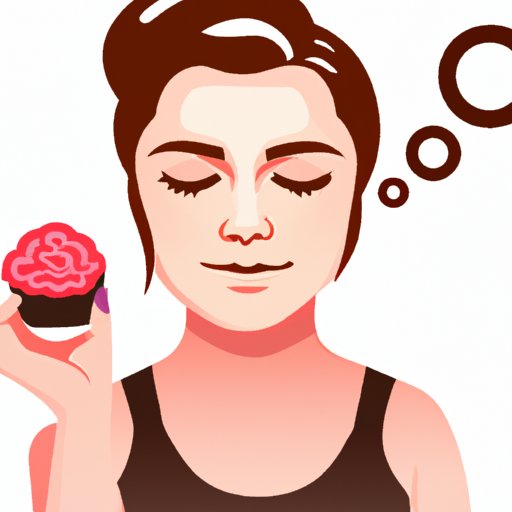
Introduction
Brain freeze: it’s that uncomfortable sensation you get when you eat or drink something cold too fast. Known medically as sphenopalatine ganglioneuralgia, it can ruin an otherwise perfect day at the beach, or be an unwelcome side effect of indulging in your favorite ice cream cone. In this article, we’ll take a closer look at the science behind brain freeze, as well as share some tips on how to prevent and manage it.
The Science Behind Brain Freeze: Understanding Your Body’s Reaction to Cold Foods and Drinks
So, what exactly is brain freeze? It’s a short-lived headache that occurs when something cold touches the roof of your mouth or the back of your throat. The sensation usually peaked within 30-60 seconds and last for a few minutes.
When something cold enters your mouth quickly, the rapid cooling can stimulate nerves in the mouth, which then transmit signals to your brain. Specifically, the trigeminal nerve, which is responsible for sensation and motor function in the face, nose, and mouth. These signals trigger blood vessels around the brain to constrict, reducing blood flow and leading to the onset of a headache.
7 Tips to Prevent Brain Freeze and Enjoy Your Favorite Icy Treats
Fortunately, there are several methods for preventing brain freeze. Here are some tips:
- Eat or drink slowly
- Take small bites or sips
- Don’t swallow too much at once
- Press your tongue to the roof of your mouth after consumption
- Drink room temperature water or warm beverages to ease the transition
- Cover your mouth with your hand and breathe into it
- Avoid your favorite icy treats altogether, instead opting for warm ones.
Remember, moderation is key when it comes to preventing brain freeze. Try to avoid overly cold foods and drinks if you’re prone to getting them.
From Evolution to Brain Freeze: Tracing the History of This Uncomfortable Sensation
Brain freeze has been documented as far back as the ancient Greeks, who believed it to be a divine punishment for gluttony. However, it wasn’t until the late 19th century that sphenopalatine ganglioneuralgia was first mentioned as a medical phenomenon.
While it’s unclear why we experience brain freeze, some researchers believe it’s an evolutionary response to protect the brain from cold temperatures. When the brain experiences a sudden drop in temperature, blood vessels quickly constrict and warm the blood before it can reach the sensitive tissues of the brain.
Are Some People More Prone to Brain Freeze? Exploring Genetics and Brain Freeze
While anyone can experience brain freeze, some people may be more susceptible than others. Studies have found that individuals with a family history of migraines may be more prone to developing brain freeze, as well as those who suffer from frequent headaches.
Additionally, brain freeze is more common in adults than children, possibly due to changes in the trigeminal nerve that occur with age.
The Physical and Psychological Effects of Brain Freeze on the Human Body
In addition to the discomfort of a headache, brain freeze can also have physical effects such as increased blood pressure and heart rate, as well as psychological effects such as anxiety and mood swings. However, these effects usually subside quickly once the headache has passed.
Natural Remedies and Quick Fixes for Brain Freeze Discomfort
Thankfully, there are several natural remedies and quick fixes that can alleviate brain freeze discomfort:
- Press your tongue to the roof of your mouth to warm it up
- Sip on warm water to ease the transition from cold to warm
- Munch on a small handful of dry, salty snacks like pretzels to encourage blood flow to the brain to warm it up
- Apply a warm compress to your forehead or the back of your neck
- Massage the roof of your mouth with your tongue
- Wait it out – most brain freeze headaches will subside on their own within a few minutes.
Brain Freeze vs. Migraines: Understanding the Differences and Managing Your Symptoms
If you experience frequent headaches, it may be difficult to determine whether you’re suffering from brain freeze or a migraine. While both conditions can share some symptoms, such as throbbing pain in the head, migraines typically last much longer and are usually accompanied by other symptoms such as sensitivity to light and sound, nausea, and vomiting.
If you’re prone to migraines, you can try some of the same prevention methods mentioned above to help reduce the frequency and intensity of your symptoms.
Conclusion
Brain freeze may be an uncomfortable sensation, but with a little knowledge and preparation, you can prevent and manage it. Remember to eat and drink slowly, and avoid overly cold foods and drinks if you’re prone to brain freeze. And if you do experience a brain freeze headache, try some of the natural remedies and quick fixes mentioned above to get some relief.
With these tips in mind, you can indulge in your favorite icy treats without fear of the dreaded brain freeze ruining your day.





